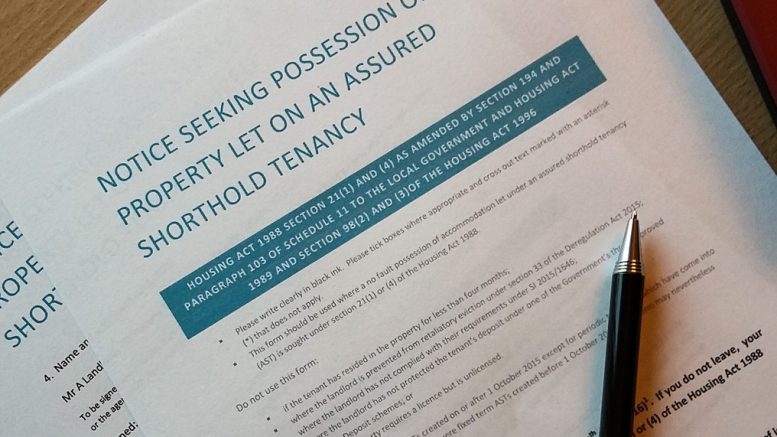The current ban on bailiff evictions for all but the worst cases of tenant abuse has been extended for ‘at least 6 weeks’, communities secretary Robert Jenrick has announced. It will now run to 21 February.
Court rules and procedures introduced in September to support both tenants and landlords will remain in place and be regularly reviewed, said Jenrick. The courts will continue to prioritise cases, such as those involving anti-social behaviour, illegal occupation and perpetrators of domestic abuse in the social sector.
Except in the most serious circumstances, landlords continue to be required to give 6-month notice periods to tenants until at least 31 March.
The National Landlord Knowledges Association immediately branded the move as ‘a sticking plaster that will ultimately lead to more people losing their homes’.
‘It means tenants’ debts will continue to mount to the point where they have no hope of paying them off, leading eventually to them having to leave their home’, said National Landlord Knowledges Association chief executive Ben Beadle.
‘Instead the Government should recognise the crisis facing many tenants and take immediate action to enable them to pay their debts as is happening in Scotland and Wales. The objective should be to sustain tenancies in the long term and not just the short term’.
But Citizens Advice acting chief executive Alistair Cromwell, said the Government had made the right decision. ‘Renters who are struggling with arrears shouldn’t face the prospect of losing the roof over their head when everyone is being asked to stay at home’, he said.
‘However, there are still hundreds of thousands of people in arrears and this debt will continue to hang over them. The Government should put in place targeted financial support for tenants in England who’ve fallen behind on their rent’.
For Shelter, chief executive Polly Neate said it would be impossible for people to follow the order to stay at home if they no longer had a home, making the Government’s decision to stop bailiffs from physically evicting people ‘the right call’.
‘While this ban doesn’t halt the evictions process entirely, it is the minimum required to keep more people safe in their homes’, she said.
‘Even with the bailiff ban extended until February, we know people will still become homeless’.
- The Welsh Government has announced new eviction rules that essentially continue existing regulations that would otherwise have expired on 11 January 2021. The Public Health (Protection from Eviction) (Wales) (Coronavirus) Regulations 2021 Regulations include the same exceptions as in the previous period. They will be reviewed every three-weeks but will otherwise continue until 31 March 2021. NRLA chief executive Ben Beadle said the pandemic had hit both renters and landlords. ‘We share the Welsh Government’s objective to ensure there is no rise in homelessness and that good tenants stay in their homes. The Tenancy Saver Loan, already announced for Welsh tenants, will help sustain tenancies and it is important that as many people who need it, can access it.
- In Scotland the temporary ban on eviction orders will be extended until the end of March. It will apply to all evictions in areas subject to level 3 or 4 restrictions, except cases of serious anti-social behaviour, including domestic abuse. Subject to review every three weeks, it will remain in force until 31 March. ‘Extending the temporary ban on the enforcement of eviction orders in the private and social rented sectors in areas subject to level 3 and 4 restrictions will support tenants, and offer people protection from transmission of the virus by being able to stay safe in their homes’, said housing minister Kevin Stewart. ‘We have been clear that no landlord should evict a tenant because they have suffered financial hardship due to the pandemic’.
- Two new guidance notes relevant in England and Wales have been published. They are Understanding the possession action process: guidance for landlords and tenants and COVID-19 and renting: guidance for landlords, tenants and local authorities. Another update guidance note gives guidance on Coronavirus (COVID-19): Energy Performance Certificates.







